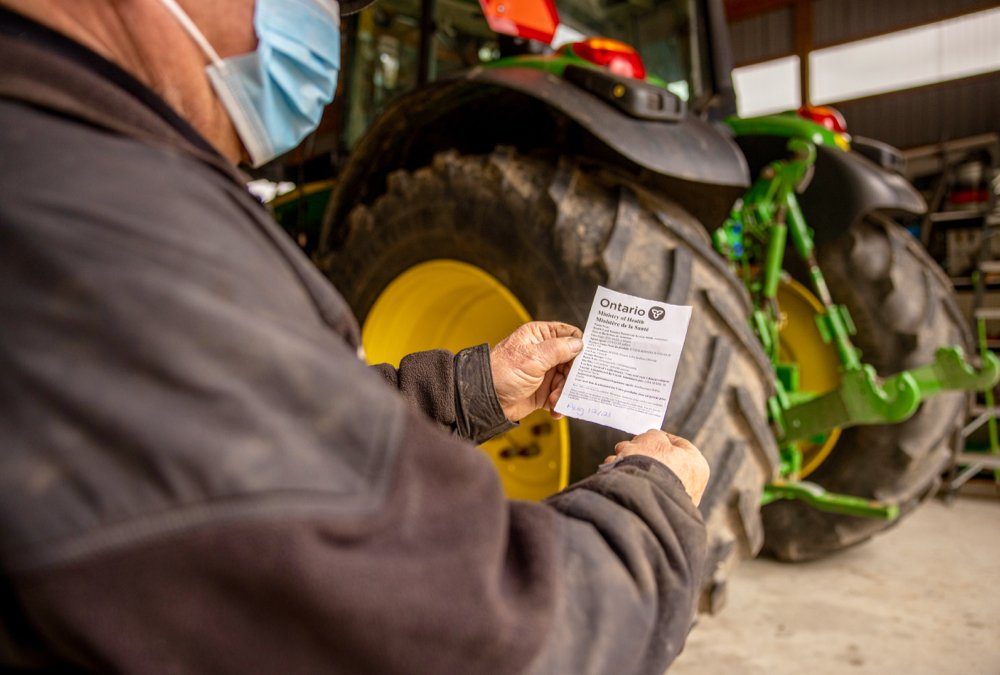Vaccinations come to Ontario farm country

The agriculture sector isn’t needling the province to organize vaccine clinics for workers. Many employers are stepping up to make sure it gets done.
Agriculture sector workers, including those in processing, temporary foreign workers (TFWs) and those in food production, including farmers, were eligible for Phase Two pre-registration in early March. By mid-April, many still had not been able to access vaccines.
Why it matters: Regional efforts are helping decrease the chance of COVID-19 outbreaks within the food supply chain.
Access to vaccination had improved in some areas by early May. However, in some regions there was confusion over whether farmers should be categorized as food producers or as working from home, which means they are not yet eligible.
Collaborative pop-up vaccine events, like the one organized by the Holland Marsh Growers Association or federations of agriculture in conjunction with local health units, are moving the goalposts in COVID-19 food supply protection.
In the food sector, companies like Maple Leaf Foods organized their own clinics.
“Getting the vaccine into the arms of our farmers and their workers is a huge relief to all the families across the Marsh,” said Jody Mott, HMGA executive director. “But it is also critically important to ensure we are able to safely grow the produce that Canadians across the country require.”
Fifty-five per cent of Ontario root vegetables are grown in the Holland Marsh, and the recent clinic provided a first vaccine dose to 90 per cent of the Holland Marsh agriculture workers.
“It was an impressive operation; entire farms would arrive and queue to be vaccinated. Everyone was in and out in about 40 minutes or less,” said Jonathon
Scott, Bradford Ward 2 councillor. “There was just something special about nurses getting people vaccinated right in the heart of the Marsh in barns and greenhouses.”
Similar pop-up clinics have happened throughout the province in Chatham-Kent, Lambton County, Brant County, Elgin County, the Niagara region and Timiskaming. The Ontario Food Terminal is also offering a pre-registered on-site vaccine clinic for frontline warehouse workers, buyers and farmers.
Other areas like Middlesex County continue to count farmers as workers at home and haven’t provided vaccine access other than to those who qualify by age.
“We wanted to make sure our farmers who farm day-in-day-out were protected,” said Sandra Vos, past-president of the Brant County Federation of Agriculture.
Vos, who had been in public health years before, used her knowledge to organize a clinic with the Brant County Health Unit and created a unique link allow- ing farmers to register their whole family for a vaccine.
“We just see this as a really good way of keeping our farmers in a better position to ward off COVID-19,” Vos said. “A lot of our farmers work by themselves, they don’t have a lot of family members to step in if they get really sick.”
On April 25, Amanda Bell, regional assistant dean at McMaster University, Michael G. DeGroote School of Medicine, Niagara Region Campus, tweeted how exciting it was to be part of the Seymour Hannah Sportsplex farmworker vaccination clinic in St. Catharines.
“The volunteer translators from Quest CHCH are amazing,” Bell tweeted.
“By the end of today, we should have vaccinated more than 3,000 workers from 153 farms. Grateful to these men and women for the hard work they do.”
The Twitter feed of Cathy Lennon, Ontario Federation of Agriculture’s general manager, can be followed to learn where agriculture workers can access vaccines across the province.
Lennon has also brought attention to companies like Maple Lodge Farms and Maple Leaf Foods who have hosted on-site vaccine clinics for employees.
“Grateful to see our farming and food community coming up in the vaccine line-up,” Lennon tweeted April 27.
Peel Region Health authorities chose Amazon, Maple Lodge Farms and Maple Leaf Foods to run on-site vaccine clinics at their Peel area facilities within hot-spot areas.
Janet Riley, Maple Leaf Foods vice-president of communications, said they were given the green light to run a clinic the week before and, although it was hectic, they were up and running days later.

photo:
Maple Leaf Foods
“We’d ordered the syringes and everything you would need to run a vaccination clinic, just so we had those supplies in case we were able to obtain the vaccine,” she said. “It was a real thrill last week when we found out that we were getting the opportunity to do it in our four clinics.”
Maple Leaf Foods employs nurses who administered 625 first doses to the Peel region workers rep- resenting approximately 70 per cent of their workforce, said Riley.
“We believe on-site vaccinations will be one of the most effective and efficient approaches to advance the Canadian vaccination program,” said Riley. “The day of the first clinic, there was joy. I mean it was incredible, people were so happy to get it and to see the sense of relief they had… it was really neat to see (our nurses) in action.” She said some employees had already taken advantage of their paid leave to access community-sourced vaccines during work hours.
In addition to the Peel facilities, Maple Leaf Foods worked with local health authorities in Edmonton, Lethbridge and Montreal to bring mobile vaccine clinics to those facilities.
Maple Leaf Foods has committed to sponsoring community clinics run through Peel Regional Health, but they are still working out the details, said Riley.

